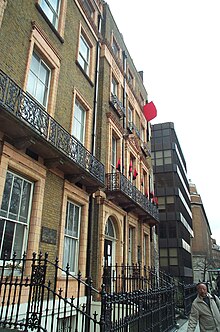


In England and Wales, squatting – taking possession of land or an empty house the squatter does not own – is a criminal or civil offence, depending on circumstances. People squat for a variety of reasons which include needing a home,[1] protest,[2] poverty, and recreation.[3] Many squats are residential; some are also opened as social centres. Land may be occupied by New Age travellers or treesitters.
There have been waves of squatting through British history. The BBC states that squatting was "a big issue in the Peasants' Revolt of 1381 and again for the Diggers in the 17th Century [who] were peasants who cultivated waste and common land, claiming it as their rightful due" and that squatting was a necessity after the Second World War when so many were homeless.[4] A more recent wave began in the late 1960s in the midst of a housing crisis.
Many squatters legalised their homes or projects in the 1980s, for example Bonnington Square and Frestonia in London. More recently, there are still isolated examples such as the Invisible Circus in Bristol.
Under Section 144 of the Legal Aid, Sentencing and Punishment of Offenders Act 2012, squatting in residential property became a criminal offence on 1 September 2012.[5][6] Squatting in non-residential property may be a civil or a criminal matter, depending upon the circumstances,[7] and repossession by the owners, occupiers or intended occupiers may require legal process or police action.
- ^ Reeve, Kesia (11 May 2011), Single people falling through cracks into years of homelessness, Crisis, archived from the original on 28 September 2011, retrieved 24 May 2011
- ^ Carter, Helen (9 March 2011), Squatters launch protest at RSB branch in Manchester, London: Guardian, archived from the original on 7 March 2016, retrieved 24 May 2011
- ^ Riot police tackle 'illegal' rave in High Holborn, BBC, 31 October 2010, archived from the original on 22 October 2019, retrieved 24 May 2011
- ^ Squatters: Who are they and why do they squat? Archived 13 May 2019 at the Wayback Machine, BBC
- ^ "Squatting set to become a criminal offence". BBC News. 31 August 2012. Archived from the original on 20 September 2019. Retrieved 20 June 2018.
- ^ "Ministry of Justice Circular No. 2012/04 – Offence of Squatting In a Residential Building" (PDF). Archived (PDF) from the original on 16 January 2013. Retrieved 7 September 2012.
- ^ Criminal Law Act 1977 section 6